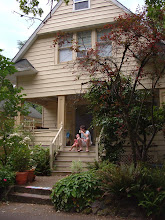One of the best things about being done with my thesis is that on a holiday like today, Martin Luther King Jr. Day, I'm not stuck at home flipping through architecture books and trying to churn out pages. I actually got to go out into the world and do something that pertains to the holiday--in this case, go door to door and collect food for Oregon Food Bank. I kept SB out of school (her preschool is one of the few that stays open on most holidays except the big ones) and met a friend and her daughter--and 150 other people--at Abernethy School in SE Portland, where we were given a pep talk about Obama's National Day of Service and offered pretzels and bagels before we ventured out into the neighborhoods.
It was a fabulously clear, albeit cold and windy, day to be wandering through one of Portland's prettiest neighborhoods and pulling wagons full of canned foods while two four-year-olds scampered ahead, pretending to be banana-eating dinosaurs or baby hawks. Most of the people we talked to were glad to see us, ducking back into their warm homes to rummage through their cupboards and returning with armloads of cans and boxes. When we thanked them, some said, "No, thank you." Maybe it's the good weather, maybe it's the spirit of the day, but I think mostly, at least in this inner-eastside neighborhood, it was the anticipation of tomorrow's inauguration that has us all in fine spirits.
Those of you who know me know that I've never been a political person. Sure, I always voted (except one year in the 1990s when I forgot to go to the polls, but I was in college and also sometimes forgot to go to class--hence that F in geology), signed petitions, read the occasional op-ed piece, etc. But like a lot of women, since having a kid in 2004, I've changed.
Sure, if you're left-leaning, the past four years would be a pretty good time to become interested in politics, new parent or not. After all, 2004 was the year Barack Obama electrified the Democratic National Convention and George Bush was reelected for his second miserable term. I was in my last trimester the day I first heard Obama on the radio, giving his now famous speech talking about one America. I was swollen and grouchy and craving a huge plate of teriyaki chicken and rice. On our way to pick up some takeout, the rising crescendo of his voice cut through the NPR white noise and I turned up the volume. We pulled up in front of the restaurant and I gestured for Alex to go inside alone to the get food; by the time he returned, I was choking back tears. I couldn't remember the last time I'd been moved to tears by a politician's rhetoric.
That year, election day fell on my birthday; SB had been born only weeks earlier. As results started coming in that evening and analysts tried to make sense of the numbers, there I was, bouncing on one of those big yoga balls with a six-week-old clutched to my chest, sleep-deprived and bewildered--both by hormones and the dawning realization that it would be four more years of buffoonery in the White House. Needless to say, one of the crappiest birthdays ever.
I'd like to say that was a turning point for me, but it wasn't really. After all, the first year of parenting is more like an improv act, full of bits that work and bits that don't. I didn't become a rabid political junkie: I still can't identify more than a handful of U.S. senators in a matching game of names and photos. But that was definitely when I began to understand turning inward, as comforting as it may be, wasn't making anything better. Besides being a crappy conversationalist, I was most obviously a crappy citizen, which meant there was a good chance my daughter would grow up to be a crappy citizen, too. So I began doing volunteer work here and there, giving more money to causes I believed in, and figuring out ways to be a more active, public person. I even made phone calls during the heated days before the 2008 election, asking sometimes hostile people if they'd turned their ballots in. The pre-mom me would never have done anything so political.
But with this new openness and sense of obligation to the world comes something else that's been harder to adjust to: optimism. As a young adult in the 1980s and 90s, optimism was akin to naivete. Sure, we got married and had kids--optimistic acts, for sure, but ones somehow tainted by practicality and resignation that these were things that middle-class adults did. But my cynicism of and disdain for the American government and, at times, for the very notion of being an American were elemental--birthrights, even, given that I am the descendant people who's autonomous island nation was seized by greedy American businessmen and made into the fiftieth state in the union.
So it's hard for me to grasp but what started with me crying outside a takeout restaurant while in my third trimester, and wend its way through a thesis project called "At Home in the World: the Middle-Class American Home as a Twenty-first Century Public Space," and led to my daughter and I knocking on strangers' doors and asking them to donate canned food--this is what optimism looks like. Of course, when, at Abernethy School, an earnest young woman and man led us through a round of "We Shall Overcome," I couldn't help but roll my eyes and wander off on the pretense of finding my daughter: I can't unlearn old habits overnight, after all.
Monday, January 19, 2009
Subscribe to:
Post Comments (Atom)




No comments:
Post a Comment